Tag Archive for: teamwork
No Assholes On The Team
in Culture Change, Leadership, Team/by Darren BradyThe Perth Scorchers are so far the most successful team in BBL history, having won three championships and coming runners-up twice in its 7-year history. The coach of the scorchers is nonother than former Australian cricketer Justin Langer who played 105 Test matches for Australia between 1993 and 2007, scoring 7696 runs and 23 centuries. Having been a key player in great Australian teams captained by Steve Waugh and Ricky Ponting, Justin knows what it takes for a team to be successful.
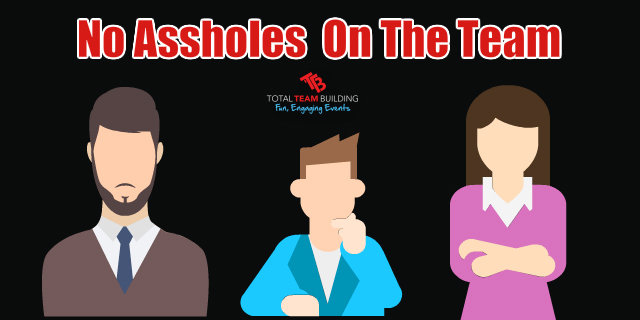
One of his philosophies that underpins the scorchers success and ethos of his team is the phrase “No assholes on the team”
“It is a reminder that we don’t want knobs in our organisation,” Langer explains.
Langer learned about this philosophy from Stanford Business School professor Bob Sutton’s book “The No Asshole Rule: Building a Civilized Workplace and Surviving One That Isn’t.”
Put simply demeaning people do terrible damage to others and to their companies. It is like cancer that will spread and destroy the culture of your team creating a toxic environment.
I recently spoke with Darren Demello of Perth’s 6PR radio station about the “No Asshole Rule” when it comes to building teams, poor leadership, character, and behavior. Click below to listen to the podcast.
Recommended Reading
What is the Ideal Team Size for a Working Team?
in Team/by Darren BradyIn many organisations worldwide the question of team size comes up any time a new team needs to be formed or an existing team is being evaluated. While this isn’t the only factor that affects how a team will behave, nor is it the most important in the majority of cases, it is an undeniably relevant question that demands a logical answer.
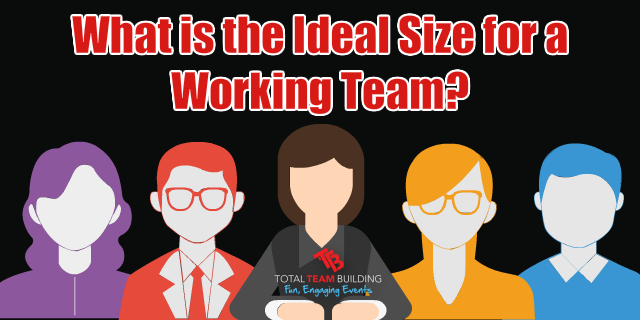
Why Team Size Matters
Teams of different sizes behave in vastly different ways. If you don’t manage to strike the balance properly with regards to the size of your team you might end up with a lot of preventable problems. Those teams that are too small risk having a skills gap in an important area while teams that are too large risk a loss of productivity and cohesiveness.
While it’s true that each team and each company is in a unique position with its own employees, there are some standards that have been proven true throughout a wide range of companies in hundreds of studies done around the world. When it comes to teams, size matters. There is no set number that everyone agrees is the best, because it can be different depending on a few variables, but it is certainly something to take into account when you want to form a working team.
Theories About Team Size Versus Productivity
Productivity is one of the main reasons teams are formed. Some company tasks can only be completed well when a team is working on them versus an individual trying to accomplish the same task. However, if a team is too large there is a huge risk of productivity of each individual worker going down as the size of the team goes up. This is referred to as social loafing and is illustrated beautifully by the Ringelmann effect.
The Ringelmann effect refers to some of the earliest research ever done about team size. Through an experimental process involving increasingly large groups of people pulling a rope, Ringelmann deduced that for every person added beyond 5-6 people, individual contributions to the group became smaller. Essentially this means that although larger groups might have higher rates of overall productivity than smaller teams, the individual members of the larger team have lower rates of productivity than those in the smaller team.
This theory is commonly referred to as social loafing. When efforts are being expended by more people, the team as a whole is more likely to experience a decrease in individual work efforts. Some employees may start to slack off, knowing that their lack of effort will be compensated for by the other working members of the team. Others just simply won’t work as hard as they otherwise would because it is more difficult for them to see the effects of their contributions to the team. Altogether this leads to increased overall output and decreased individual output, a scenario that doesn’t suit your company well.
How To Determine The Best Size For Your Team
So, how can you avoid the Ringelmann effect in your organisation? How can you know the ideal size for your particular team? These are questions that have been asked by millions of companies around the world. Unfortunately, there is not one answer that applies to all companies, as the size of the team is completely relative to the task that must be performed by the team.
Team size depends mostly on these three variables:
1. What is the team trying to accomplish?
Different organisations have their own needs. For example, a team of painters can never really be too large as the building will get painted more quickly with a larger team than a smaller team. However, a corporate team of auditors will not experience the same effect and might see more negative results from having a team that’s too large.
2. How many specific and separate roles are necessary to complete the team goals?
What is the absolute number of unique roles you need for your team to succeed? You have to ensure that the team will not have any skills gaps, as this may prevent success and cause frustration. But, you also want to avoid having too many people with similar job skills and roles on the same team as they will begin to lose motivation and productivity.
3. Is there a deadline set for work completion?
Work that needs to be done quickly can sometimes call for a larger team with more working power to accomplish all the necessary tasks on time. This is especially true if no creativity is required for completion of the tasks. Longer-term projects can benefit from smaller teams that will experience more cohesion and positive discussions about the work.
The Widely Accepted Answer
According to Katherine Klein from Wharton University, the widely accepted ideal size for a working team is five people. If you go beyond five people the team starts to lose individual performance, while teams smaller than 5 people can experience awkward team dynamics and skills gaps.
Klein’s research matches that done by other researchers around the world who have also tried to answer this question. The second most common answer to the question of ideal working team size is six people, as the dynamics of even versus odd numbered teams can cause some differences in opinion.
Forming Your Ideal Team
At the end of the day, you have to look at the needs of your organisation and the reasons behind team formation. Why do you need a working team formed, and how many people will be required to best fulfill the requirements placed on your team?
Don’t stress as much over the size of the team as you do about more important factors of team success, such as the ability to work well together, filling all the necessary roles, and diversifying the team. Total Team Building
If you have a new team or are looking to build a better functioning team then contact Total Team Building. We have a range of team building activities that can help team members get to know each other and work together more effectively.
Qualities of a Good Team Player Versus a Bad Team Player
in Culture Change, Team/by Darren BradyTeamwork is very present in business today. As a result, many HR departments and hiring managers are looking for those who are going to work well within teams to achieve their goals. Being good at working with a team, sometimes referred to as being a “good team player”, can come in handy for advancing your career and doing better in your workplace.
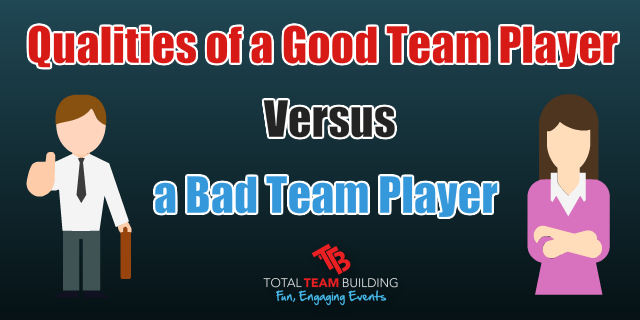
What Makes Someone a Good Team Player?
Those who are good at working in a team don’t necessarily act or work the same way, but what they do have in common is that you can count on them to benefit the team rather than breaking it apart. Not all employees are good at being in teams. There is a certain set of qualities you can look for in a good team player versus a bad team player.
Misconceptions About Team Relations
Hearing the phrase “good team player” makes it sound as though the person you’re referring to goes along with the flow of the team and does their work without questioning anything. This, however, is not the ideal way for a team member to act and would actually make them a poor team player.
Keeping the peace in a team is useful, but controversy can actually bring about a lot of good solutions to problems and add new points of view to a conversation. The definition of a good team player is not someone who is overly compliant and unquestioning of the leadership, but someone who pulls their own weight, contributes positively to the team, and works hard to achieve the goals of the team.
Qualities of a Good Team Member
These are the qualities that a good team player should possess:
- Reliability
Team members rely on each other heavily to get work accomplished and reach milestones and goals. Good team members must be reliable. Without reliability it doesn’t matter how good of work you do.
- Understanding of Strengths and Weaknesses
If you want to contribute as much as possible to the team, you need to know what you have to offer and what it is that you’re bad at. This will allow you to work more in the areas of your strength and add value to the team while letting others help you fill in your weaker spots.
- Good Communication Skills
Communication within a team is needed on any project. A good team player is able to share information and resources with other team members and communicate whatever is necessary.
- Flexibility
Teams cannot always make exceptions and work around your needs. You have to be flexible to accommodate the needs of the team and to work well with others.
- Willingness to Compromise
Recognizing that your point of view and your ideas are not always going to be embraced is important. It’s a good skill to learn how to compromise. However, that doesn’t mean you should let others walk on top of you and dismiss your ideas.
- Listening
Learning to listen to your teammates can help you to understand everything that’s going on within the team and what needs to happen. Knowing where others stand on issues is important before you can give an informed opinion or idea.
- Commitment to Team Goals
The primary goal of a team is to accomplish some goal or purpose. In order to be a good team player, you have to be committed to that goal and keep it in focus.
- Problem Solving
Anyone can point out problems. However, those who not only point out problems but also offer a solution are much more valuable to any team.
- Support Team Members
Sometimes your team members will have more success than you or will need help from you. In either case you should be a supportive team member in order to be of most use to your team.

Other Opinions About Teamwork and Team Dynamics
Some professionals have a differing opinion. In the opinion of others, team players are not useful and businesses should look more for those who can do the job on their own if necessary. By finding those capable of doing the job themselves, you’re more likely to have a stronger team.
This is a different way of thinking about teams, and while it’s not the best way to arrange a team there may be some merit in this thought.
Conclusion
Teams need people that work well together to accomplish a unified goal. Without this, a team will fail. Whatever you believe makes someone a useful part of a team, the qualities listed above will always help you to succeed in teams.
Team Building helps build working relationships and better team players?
Total Team Building specialise in teams…we facilitate a range of team building activities that help build team morale, trust, leadership & communication within a team. For more information about how Total Team Building can help you contact us today.
Creating the Conditions for Effective Teamwork
in Team Building/by Darren BradyWhat is Effective Teamwork?
Everyone wants to be a part of an effective team or to lead one, but what exactly does it mean for a team to be effective? In most cases, you can assume that an effective team is one which succeeds more often than it fails.
Effectiveness does not mean that there is no failure, but it should mean that the team accomplishes a much higher level of useful work than failed or unhelpful work. An effective team will make long strides towards achieving organisational goals, while an ineffective team will be slow moving or completely stagnant in terms of accomplishments.
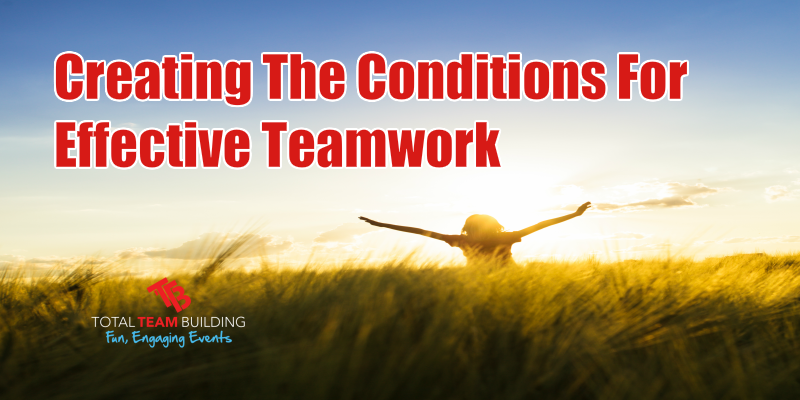
Set Your Team Up for Success
Teams can only become effective if they are created and continued under the right conditions. You can start a team for any purpose and at any time, but if you want it to be EFFECTIVE, you should work to include these elements in the team environment from the beginning to the end of the life of the team:
1. SMART Team Goals
In business, the acronym SMART stands for Specific, Measurable, Attainable, Realistic, and Time-bound. Any goals you set for your team should follow this guideline and fit into every single one of the five categories. Without a clear goal and a vision for what the team is supposed to be doing, team members will become discouraged and will not be as effective at their work.
Teams with clear, SMART goals are usually able to go further than any of organisational teams and will have a greater sense of unity in the pursuit of their accomplishments.
2. Identifiable Roles and Purpose
Every team member should know what their purpose is on the team. There should never be any members who feel as if they are not necessary on the team or that they don’t have a useful job. If they feel this way, it’s possible that they are right and they can or should be removed from the team to make it more efficient.
Define every member’s specific role and make certain that they are aware of it. You might try making an organizational flow chart or information chart to illustrate how each member fits into the team and is supposed to contribute.
3. Diverse Membership
If you set up your team with members who are all very similar or who have similar skill sets, you cannot expect that team to excel in all areas. Create a few layers of diversity by blending together team members from a variety of backgrounds and with a complementary or opposite skills. This will help to ensure that there is enough collective knowledge to get any task done while also cutting down on unnecessary debates over small technicalities.
4. Accountability
How do your team members know what excellent performance means for their team? Will anything happen if they fail or if they succeed? Set up a system of accountability that will help your team to know that their performance is measured and that it matters. Be sure to demonstrate what great performance means and to reward great work from individuals and the team as a whole.
This step can be hard to implement, but it is one of the most important to making an effective team. If you cannot set standards of performance and ensure that they are maintained, performance levels will usually go down over time. On the other hand, if you can keep team members accountable for their own performance and total team performance they will generally maintain a high level or improve over time.
5. Team Member Selection
Just as you should pay attention to diversity, as stated in point #3, you also need to look at the team as a whole and choose members who will work well together. Teams are not just a collection of highly skilled workers thrown together. Selection of members requires more thought than that, as you want to choose those people who will work well with others and will contribute to the group rather than trying to work on their own apart from the team.
6. Appropriate Feedback
It’s been shown that organizations and teams that don’t give enough feedback to their employees tend to have dissatisfied and less effective employees. To solve this problem, make sure you as the team leader are giving feedback whenever possible and appropriate. Don’t wait to an annual performance review, but give constant feedback at goal milestones, every month, or whenever you see the opportunity to praise or train a team member.
7. Collaborative Efforts
Teams without collaboration are absolutely pointless. In an organization where most of the departments or employees are used to working as individuals, you will have to make it clear that your team requires some level of dependency and collaboration for success.
8. Efficient Communication
Closed-off communication and stuffy employee relations can lead to issues with your team. Don’t let communication be the reason for team failure. Instead, promote open communication between yourself and the team as well as between individual members. You can take the lead and host team building exercises, have meetings dedicated to team communication, send out regular information, and take any other steps you see fit to help get your team talking.
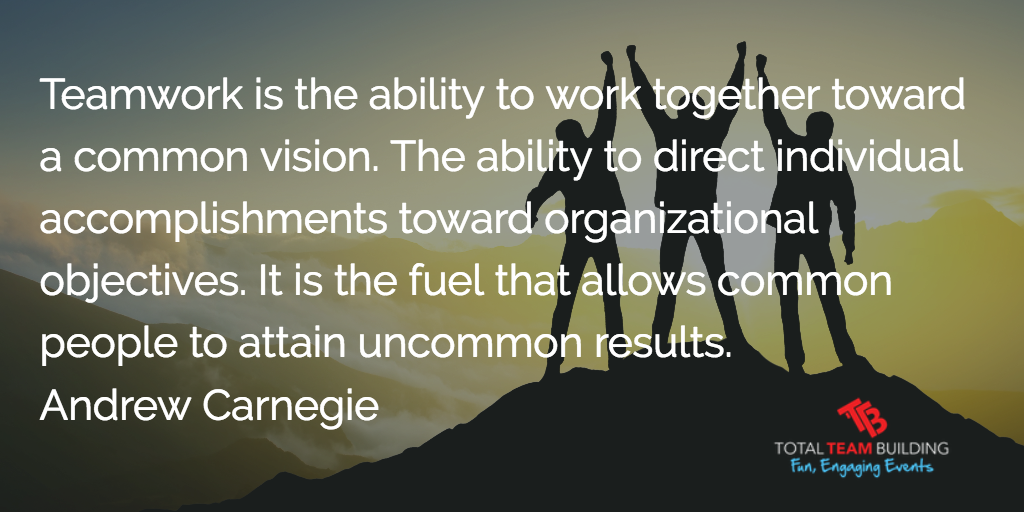
What Can Go Wrong?
Even if you are able to create the perfect conditions for team work to be effective, you have to understand that there might still be problems and difficulties within your team. A team is made up of a lot of different pieces, none of which are perfect. This can lead to conflicts and differences of opinion that might lead to a lot of struggles for your team members.
Conflict is always the most difficult part of working with teams. It can come in all shapes and sizes from personal conflicts between members to professional conflict based on idea disagreement and more. The best way to help alleviate conflicts and make them easier to get through is to continue promoting and facilitating open communication between all members of the team and with team leaders.
Despite the usually negative mental associations with have with conflict, it can actually be turned into a productive part of your team if you know how to handle it properly. Disagreements are not unnatural and they can produce some of the best work you have every done if you can make sure you keep the conversations critical, precise, and professional rather than allowing discussions to get personal and stubbornly opinionated. Two team members shouting or refusing to speak does a lot of harm, but two members debating the merits of an idea can be incredible for your team.
Evaluating Team Effectiveness
At the end of the day, whether your team is effective or not, you need to set up a way to track the performance of the team and how effective it is. If you notice things going poorly, ask yourself which of the above listed elements are missing from your team’s environment and work on improving in those areas. If you are succeeding, record what you are doing and keep building on the foundations to create the best team your organization has ever had!
About Total Team Building
Total Team Building specialise in teams…we facilitate fun and engaging team building activities designed to enhance teamwork, team culture, leadership, communication and collaboration. For more information about how Total Team Building can help you and your team contact us today.
